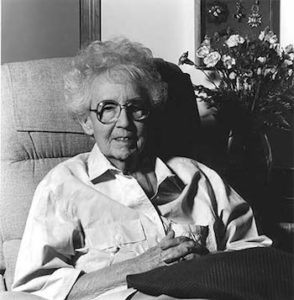
Lydia Cabrera
Lydia Cabrera was born on this date in 1899. She was an Afro Cuban writer and literary activist.
Born in Havana, Cuba, she was the youngest of eight children in a family of social and financial privilege in pre-revolutionary Cuba. Her father, Raimundo Cabrera Bosch, was also a writer, jurist, lawyer, and former activist for Cuba's independence. Her mother, Elisa Marcaida Casanova, was a housewife. The family had many African servants and child caretakers who introduced young Lydia to the world brought to Cuba by the Middle Passage. She learned about African folklore, stories, traditions, religions, and their mystical world through them. Her father’s contributions are also evident in many of her writings.
Her adult interest in Afro Cuban culture began when she went to Paris in 1927 to study Asian religion and art. She studied drawing and painting in Paris with theatrical Russian exile Alexandra Exter. Cabrera lived in Paris for 11 years, returned home in 1938, and left Cuba again as an exile in 1960. She went first to Madrid and settled later in Miami, FL.
Author of 23 books on Afro Cuban themes, she was one of the first writers to recognize and make public the richness of Afro-Cuban culture. She made valuable contributions to literature, anthropology, and ethnology. Her most famous book, "El Monte" (The Forest), published in 1954, became a "bible" for Santeros who practice Santeria, a blend of Catholic teachings and native African religions that evolved among former African slaves in the Caribbean.
Cabrera was a woman with a deep cultural background and humility. She created the Negro's identity and their incorporation into the Cuban national culture as an important and integral part of it. She received several honorary doctorate degrees, including one from the University of Miami in 1987. Cabrera described her stories as "transpositions," but they went beyond a simple retelling. She recreated and altered African and universal folklore elements, characters, and themes. Still, she also modified the traditional stories by adding details of Cuban customs of the 19th and early 20th centuries.
She represented well-known themes within universal folklore from a different perspective as well. For example, Cabrera used the popular motif of a magical object (a saucepan, a salt shaker, a tablecloth) that provides endlessly for its owner. Still, she re-created it using characters from Colonial Cuba, such as clever slaves, their white owners, and European and local slave merchants. Themes of universal folklore, such as cruel stepmothers who lost children and the magic fish that has the power to grant wishes, are also present in some of the stories she tells.
But diverging from traditional folktales, Cabrera gave her characters (gods, humans, or animals) their names. One example is Jicotea, a little water turtle with whom many Afro Cubans identify because it belongs to the lowest rung in the social scale and, therefore, has a hard life. However, it adapts and confronts its aggressive environment to survive.
Cabrera devoted her life to studying Afro Cubans and their influence on the development of Cuban folklore. This development was also influenced by the Spanish culture brought to the island during the Conquest. Lydia Cabrera died in Miami on September 19th, 1991.
Otto G. Richter Library,
written by Olga Espejo,
The University of Miami,
Coral Gables, Florida 33124,
Gianna M. Martella,
Western Oregon University